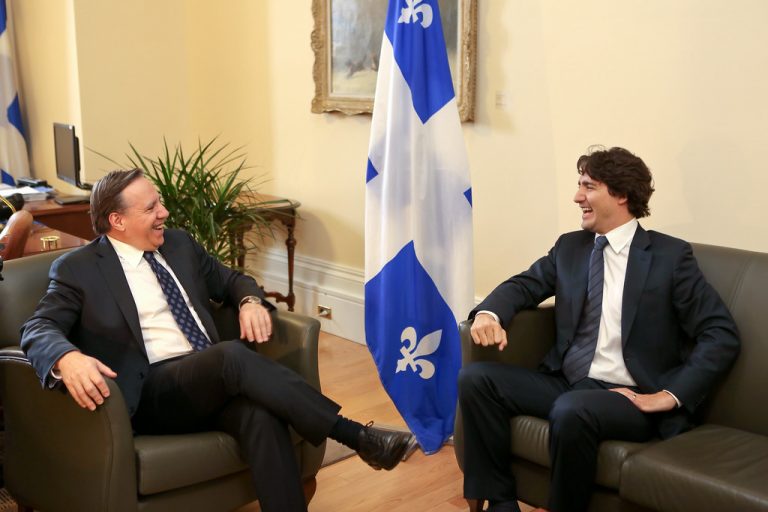
By JOHN HAYWARD
Quebec stepped up its “deconfinement plan” this week and began lifting coronavirus restrictions, while Premier Francois Legault rejected Canadian Prime Minister Justin Trudeau’s effort to crush the Freedom Convoy protest movement by invoking emergency powers.
“I think that I was very clear with the prime minister that the federal Emergencies Act should not, must not apply in Quebec,” Legault said on Monday. “We don’t have any problems in Quebec so far. The Sureté du Québec has everything under control.”
There were Freedom Convoy demonstrations in Montreal and Quebec City over the past two weeks, but they were relatively restrained and mostly held over weekends. Legault said using the emergency powers offered by Trudeau against the protesters would be unwarranted and divisive.
“I think that at this moment, it would not help the social climate. There’s a lot of pressure right now, and I think we have to be careful. We really don’t need to throw oil on the fire,” he said.
A truck participates in a blockade of downtown streets near the parliament building as a demonstration led by truck drivers protesting vaccine mandates continues on February 16, 2022 in Ottawa, Ontario. (Scott Olson/Getty Images)
Quebec lifted more of the restrictions opposed by the protesters on Monday. On Tuesday, plans were announced to begin removing vaccine passport requirements in stages, with the process completed by March 14.
Demonstrators against Covid-19 vaccine mandates gather on Highway 15 near the Pacific Highway Border Crossing on the US-Canada border in Surrey, British Columbia, on February 12, 2022. (JASON REDMOND/AFP via Getty Images)
CTV News reported that size restrictions on private gatherings have been lifted in Quebec, restaurants can seat more customers, four visitors a day are now permitted at old age homes if they have vaccine passports, and seniors are permitted limited outings.
Gyms and spas are now allowed to operate at half capacity, while outdoor events will be allowed with up to five thousand attendees.
Beginning on February 21, capacity limits will be removed on retail outlets, places of worship will be allowed to operate at half capacity, and amusement parks will be allowed to reopen with attendance limits. A week later, the capacity limits are due to be removed from houses of worship and all but the largest arenas, while bars and casinos will be allowed to reopen at half capacity. Most of the capacity limits are supposed to be phased out by the middle of March.
On Tuesday, Quebec announced the beginning of the end for vaccine passports, amusingly beginning with liquor and cannabis stores on Wednesday. The passports will be gone almost entirely by March 14, which is also when Health Minister Christian Dube is expected to begin distributing antiviral treatments for the Wuhan coronavirus.
“Proof of vaccination will still be required for domestic rail and air travel, as mandated by the federal government. Masks will also still be required in all public indoor spaces in the province,” CBC News noted.
Dube insisted the abrupt decision to remove vaccine passport requirements had nothing to do with the Freedom Convoy protests.
“We’re doing it because it’s the right time to do it. Because it’s safe for public health. And as I said, it’s there when we need it,” he said, threatening to bring the passport system back if another coronavirus outbreak hits the province.
Interim Director of Public Health Dr. Luc Boileau added that vaccine passports had become somewhat obsolete in the face of the highly contagious omicron variant, since only recent booster shots seem to have much effect against it. Millions of Quebec residents have recently been exposed to omicron, so by the time the recommended 8-12 week wait for vaccination after an infection has passed, the omicron wave should be largely over.
CBC News quoted McGill University associate professor of immunology Jorg Hermann Fritz questioning Dube’s claim that protests had no impact on the timetable for relaxing coronavirus measures.
“I think it’s populism, played straight and simple,” Fritz asserted. “It’s unfortunately a political ‘giving in’ and throwing it all out the window. That’s my interpretation.”
Friz and some Quebecers interviewed by CBC thought removing the coronavirus restrictions and vaccine passport requirements was a mistake with the omicron wave still ongoing, while others were relieved to see the end of the burdensome regulations.
Epidemiologist Dr. Christopher Labos told Global News on Wednesday that removing the vaccine passport would “remove at least one of those incentives” to get vaccinated or boosted.
“There is still a significant segment of the population that needs to get vaccinated with their third dose, if we are indeed going to protect ourselves against any future variants,” Labos said.